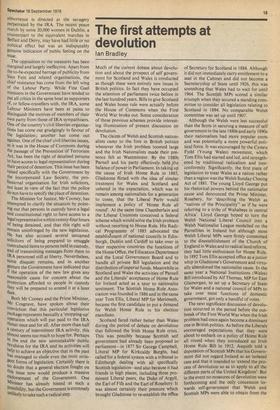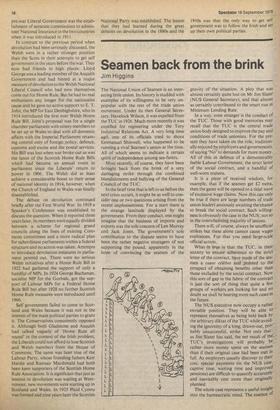Much of the current debate about devolution and about the
prospect of self government for Scotland and Wales is conducted as though these were entirely new issues in British politics. In fact they have occupied the attention of parliament twice before in the last hundred years. Bills to give Scotland and Wales home rule were actually before the House of Commons when the First World War broke out. Some consideration of these previous schemes provide interesting illumination of present discussion on devolution.
The claims of Welsh and Scottish nationalists came to the fore in British politics whenever the Irish problem loomed large and the Irish Nationalists made their presence felt at Westminster. By the 1880s Parnell and his party effectively held the balance of power in Parliament. In taking up the cause of Irish Home Rule in 1885, Gladstone flirted with the idea of similar treatment for Wales and Scotland and ushered in the expectation, which was to remain among nationalists for a generation to come, that the Liberal Party would implement a policy of 'Home Rule all round'. At the same time Chamberlain and the Liberal Unionists conceived a federal scheme which would solve the Irish problem without resorting to Home Rule. His Radical Programme of 1885 advocated the establishment of national councils in Edinburgh, Dublin and Cardiff to take over in their respective countries the functions of the Home Office, the Education Department and the Local Government Board and to handle all private Bill legislation and the distribution of imperial funds. Meanwhile in Scotland and Wales the activities of Parnell and the Liberals' acceptance of Home Rule for Ireland acted as a spur to nationalist sentiment. The Scottish Home Rule Association was founded in 1886 and in the same year Tom Ellis, Liberal MP for Merioneth, became the first candidate to put a demand for Welsh Home Rule in his election manifesto.
Scotland fared rather better than Wales during the period of debate on devolution that followed the Irish Home Rule crisis. This was possibly because Scottish self government had already been proposed in parliament—in 1877 Sir George Campbell, Liberal MP for Kirkcaldy Burghs, had called for a federal system with a tribunal in Edinburgh dealing with all specifically Scottish legislation—and also because it had friends in high places, including three prominent Liberal peers, the Duke of Argyll, the Earl of Fife and the Earl of Rosebery. It was almost certainly their pressure which brought Gladstone to re-establish the office of Secretary for Scoiland in 1884. Although it did not immediately carry entitlement to a seat in the Cabinet and did not become a Secretaryship of State until 1926, this was something that Wales had to wait for until 1964. The Scottish MPs scored a similar triumph when they secured a standing committee to consider all legislation relating to Scotland in 1894. No comparable Welsh committee was set up until 1907.
Although the Welsh were less successful than the Scots in securing a measure of self government in the late 1880s and early 1890s their nationalism had more popular roots and was potentially a more powerful political force. It was encouraged by the Cymru Fydd (Young Wales) movement, which Tom Ellis had started and led, and strengthened by traditional radicalism and nonconformity. Significantly, the first piece of legislation to treat Wales as a nation rather than a region was the Welsh Sunday Closing Act of 1881. The young Lloyd George put his rhetorical powers behind the nationalist cause and denounced the Prime Minister, Rosebery, for 'describing the Welsh as "natives of the Principality" as if he were referring to a tribe of Wahabees in central Africa'. Lloyd George hoped to turn the Welsh National Liberal Council into a Welsh Nationalist League modelled on the Parnellites in Ireland but although most Welsh Liberal MPs were firmly committed to the disestablishment of the Church of England in Wales and to radical land reform, they had little enthusiasm for Home Rule. In 1892 Tom Ellis accepted office as a junior whip in Gladstone's Government and virtually abandoned the nationalist cause. In the same year a National Institutions (Wales) Bill introduced by Alf Thomas, MP for East Glamorgan, to set up a Secretary of State for Wales and a national council of MPs to take over most functions of domestic government, got only a handful of votes.
The next significant discussion of devolution occurred in the period before the outbreak of the First World War when the Irish problem had once again become a dominant one in British politics. As before the Liberals encouraged expectations that they were about to embark on a policy of Home Rule all round when they introduced an Irish Home Rule Bill in 1912. Asquith told a deputation of Scottish MPs that his Government did not regard Ireland as an isolated case and that it intended to 'extend the process of devolution so as to apply to all the different parts of the United Kingdom'. But in the event no measures of devolution were forthcoming and the only concession towards self-government that Welsh and Scottish MPs were able to obtain from the pre-war Liberal Government was the establishment of separate commissions to administer National Insurance in the two countries when it was introduced in 1911.
In contrast to the previous period when devolution had been seriously discussed, the Welsh were in a rather stronger position than the Scots in their attempts to get self government in the years before the war. They now had friends in high places: Lloyd George was a leading member of the Asquith Government and had hinted at a major measure of devolution to the Welsh National Liberal Council who had now themselves come out for Home Rule. But he had no real enthusiasm any longer for the nationalist cause and he gave no active support to E. T. John, the MP for East Denbighshire, who in 1914 introduced the first ever Welsh Home Rule Bill. John's proposal was for a single chamber parliament with ninety members to be set up in Wales to deal with all domestic affairs with the Imperial Parliament retaining control only of foreign policy, defence, customs and excise and the postal services. His Bill was lost when war broke out as was the latest of the Scottish Home Rule Bills which had become an annual event in parliament since the Liberals' return to power in 1906. The Welsh did at least achieve a considerable boost to their sense of national identity in 1914, however, when the Church of England in Wales was finally disestablished.
The debate on devolution continued briefly after the First World War. In 1919 a Speaker's Conference was established to discuss the question. When it reported three years later, its members were equally divided between a scheme for regional grand councils along the lines of existing Commons committees and a more radical plan for subordinate parliaments within a federal structure and no action was taken. Attempts to introduce devolution measures in parliament petered out. There were no serious Welsh initiatives after a Home Rule Bill in 1922 had gathered the support of only a handful of MPs. In 1924 George Buchanan, socialist MP for the Gorbals, got the support of Labour MPs for a Federal Home Rule Bill but after 1928 no further Scottish Home Rule measures were introduced until 1966.
Self government failed to come to Scotland and Wales because it was not in the interest of the main political parties to grant it. The Conservatives consistently opposed it. Although both Gladstone and Asquith had talked vaguely of 'Home Rule all round' in the context of the Irish problem, the Liberals could not afford to lose Scottish and Welsh members from the House of Commons. The same was later true of the Labour Party, whose founding fathers Keir Hardie and Ramsay Macdonald had both been keen supporters of the Scottish Home Rule Association. It is significant that just as interest in devolution was waning at Westminster, new movements were starting up in Scotland and Wales. In 1925 Plaid Cymru was formed and nine years later the Scottish National Party was established. The lesson that they had learned during the great debates on devolution in the 1880s and the 1910s was that the only way to get self government was to follow the Irish and set up their own political parties.






































 Previous page
Previous page